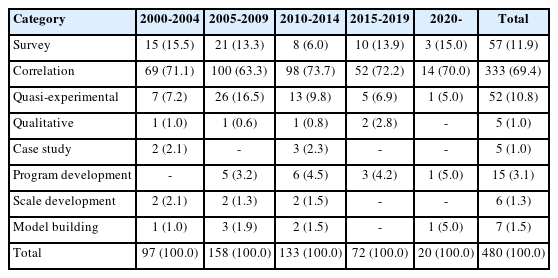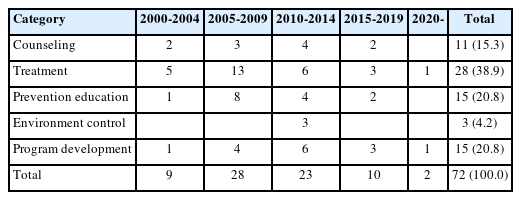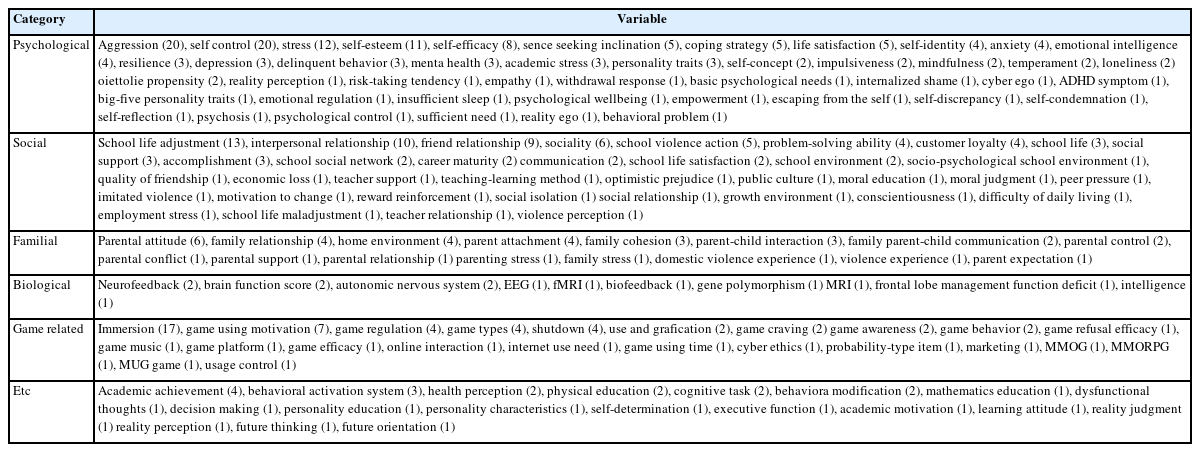게임중독 관련 국내 연구 분석
An Analysis of Research on Game Addiction in Korea
Article information
Trans Abstract
Objectives
The purpose of this study was to analyze the trend of game addiction research on 480 studies, the master's and doctor's dissertations in Korea and to propose a direction of the game addiction study.
Methods
The material used for this study were 480 studies collected from RISS database. The analytic frame of this study is research design, research subject, intervention type and research variables.
Results
Regarding research design, correlation study was the most used and survey study, quasi-experimental study in this order. In the research subject, middle·high school students were the most used. In the intervention type, treatment was the most used. In the research variables, aggression and self control were the most used.
Conclusions
These findings suggest a need to develop appropriate program to prevent game addiction and to apply subjects with game addiction.
서 론
정보통신기술의 발달과 함께 사람들은 어디서나 인터넷을 손쉽게 이용할 수 있게 되었으며, 미디어 매체의 변화로 사람들의 인터넷 게임 이용의 비중도 점차 커지고 있다. 2000년대에 들어 게임은 경제 및 문화적 측면에서 큰 영향력을 가지고 있는 매체로 성장하였다.
경제적 측면에서 살펴보면, 국내의 게임산업 규모는 2017년을 기준으로 13조 1,423억 원에 이르고, 게임산업의 종사자 수도 8만 1,932명으로 나타났으며, 전 세계 게임시장에서 대한민국은 6.2%로 미국, 중국, 일본에 이어 4위의 점유율을 차지하고 있는 것으로 나타났다[1]. 문화적 측면에서 살펴보면, e스포츠는 세계적으로 가장 인기 있는 스포츠 대회 중 하나로 2019년 기준으로 전 세계의 시청자 수가 약 4억 5,400만 명에 이르는 것으로 나타났다[2].
한국콘텐츠진흥원[3]의 ‘2019 게임이용자 실태조사 보고서’에 따르면 10대의 90.8%, 20대의 85.2%, 30대의 82.0%, 40대의 53.4%, 50대의 50.7%가 게임을 이용하는 것으로 파악되었다. 이와 같은 사회 및 경제적 지표들은 게임이라는 대중문화가 일상에서 큰 부분을 차지하고 있다는 것을 보여준다. 특히 게임의 영향력이 일상생활 속에서 커지면서 게임으로 인한 부정적인 영향이 많이 나타나고 있다.
세계보건기구(World Health Organization, WHO)는 2019년 제72차 WHO총회 위원회에서 게임이용장애(gaming disorder)를 국제질병분류(International Statistical Classification of Diseases and Related Health Problems, ICD)-11에 질병코드로 포함시키면서 게임중독을 공식적인 질병으로 보겠다는 입장을 밝혔다[4]. 게임이용장애의 진단기준은 (1) 게임에 대한 조절력 상실, (2) 일상의 다른 활동들보다 현저하게 게임행동에 우선순위를 부여, (3) 부정적인 문제가 발생함에도 불구하고 게임을 지속적으로 과도하게 이용하며, 위와 같은 세 가지의 증상이 적어도 12개월 이상 나타나고, 이러한 행동양상으로 인해 개인, 가족, 학교, 직장 등의 사회적 영역에서 기능적인 손상이 있을 때를 말한다[4]. 이러한 ICD-11의 게임이용장애 등재 결정에 따라 국내에서도 한국표준질병분류에 게임이용장애 등재 여부에 대한 논의가 진행 중이다.
게임이용은 여가나 친교활동, 스트레스 해소, 문제해결능력 증진이라는 긍정적 효과가 있는 반면[5], 대인관계 및 사회적 부적응, 통제력의 상실, 폭력성과 충동성 증가 등의 부정적 영향이 있다[6]. 게임중독은 개인의 정서적·심리적 문제, 가정환경, 대인관계, 게임시스템 등 여러 요인이 복합적으로 작용하여 발생하며 과도한 입시 경쟁, 여가시설 부족과 같은 사회적 환경과도 밀접한 관련이 있다[7]. 또한 게임중독을 증가시키는 위험요인들은 우울, 불안, 스트레스, 공격성, 충동성, 경제수준 등이며, 게임중독을 감소시키는 보호요인으로는 자아존중감, 자기효능감, 통제력, 학교 성적, 부모관계, 친구관계, 교사 지지 등이 있는 것으로 확인되었다[8].
교육현장에서 게임중독 학생들은 학교생활에 적응하지 못하고 다양한 문제행동을 일으키며 학업을 중단하게 되는 경우도 있다. 또한 게임중독은 약물중독처럼 신체적으로 심각한 문제를 야기할 가능성은 적지만 다른 유형의 중독과 같이 금단증상, 조절능력 상실, 심리적 의존성 등의 문제를 일으킬 수 있으며 다른 정신과적 문제를 동반할 가능성이 있다[9].
게임중독과 관련하여 국외연구에서는 병리적 게임사용집단이 다른 집단과 심리적 특성에서 차이를 보일 것이라는 주장이 제기되어 왔으며 특히 자기 조절에 주목하고 있다[10,11]. 자기 조절은 행동통제, 만족 지연, 목표 추구 등을 포함하는데 그 중에서 게임중독 문제와 관련이 높은 기능으로 자기 통제와 인지적 유연성이 언급되고 있다[12,13].
게임중독으로 인한 더 큰 사회적 문제를 막기 위해서 학교와 지역사회는 게임중독 위험 대상자나 게임중독 대상자들을 위해 구체적이고 실효성 있는 예방 활동은 물론 교육지원과 중재방안을 마련해야 한다. 또한 게임중독의 치료는 게임중독의 원인이 복합적인 생물-심리-사회적 요인으로 인한 것임을 고려할 때 다각적인 치료 접근이 필요하다. 이에 게임중독 관련 국내 학위논문을 분석함으로써 게임중독에 대한 연구동향을 파악하고 게임중독 위험대상자와 게임중독 대상자가 있는 교육현장과 치료현장에서 보다 효율적인 중재와 치료방안을 마련하기 위해 이 연구를 시도하게 되었다.
본 연구의 목적은 게임중독 관련 연구의 경향을 확인하고 추후 연구방향을 제시하고자 시도되었으며 게임중독 관련 연구의 연구 설계를 확인하고 연구대상자, 중재유형 및 연구 변인을 파악하여 게임중독 관련 연구를 위한 기초 자료를 제공하기 위함이다.
연구 방법
연구대상 논문의 선정
본 연구는 학술연구정보서비스의 DB를 사용하여 검색어로 ‘게임중독’을 입력하여 찾아낸 국내 학위논문 박사 34편, 석사 446편, 총 480편을 분석하였다.
연구대상 논문의 분석
본 연구는 Im et al. [14]의 연구에서 중독 관련 국내 간호연구의 분석에서 사용한 분석기준을 참고로, 학위 종류, 연구설계, 연구대상자, 중재유형 및 연구변인을 중심으로 분류하였다.
학위 종류는 석사, 박사 학위로 구분하였으며, 연구설계는 조사연구, 상관관계연구, 유사실험연구, 질적연구, 사례연구, 프로그램개발연구, 도구개발연구 및 모형구축연구로 분류하였고, 연구대상자는 유아, 초등학생, 중 ·고등학생, 대학생, 성인 및 기타로 구분하였고, 중재유형은 상담, 치료, 예방교육, 환경조절 및 프로그램 개발로 분류하였으며, 연구변인은 심리적 변인, 사회적 변인, 가족적 변인, 생물학적 변인, 게임관련 변인 및 기타로 구분하였다.
연구 결과
학위 종류
국내 게임중독 관련 학위 논문은 2000년에 처음 발표됐으며, 석사 논문이 446편(93.0%), 박사 논문이 34편(7.0%)으로 총 480편이었다(Table 1).
연구 설계
대상논문의 연구설계에 관한 분석결과를 살펴보면, 상관관계연구가 333편(69.4%)으로 가장 많았고, 조사연구 57편(11.9%), 유사실험연구 52편(10.8%), 프로그램개발 연구 15편(3.1%) 순으로 나타났다(Table 2).
연구대상자
연구대상자는 중·고등학생을 대상으로 한 경우가 234편(52.6%)으로 가장 많았고 초등학생 151편(33.9%), 대학생 26편(5.8%) 순이었다(Table 3).
중재 유형
중재를 사용한 논문을 상담, 치료, 예방 교육, 환경조절 및 프로그램 개발로 나누어 살펴보았을 때, 치료 논문이 28편(38.9%)으로 가장 많았다. 그 다음으로 예방 교육, 프로그램 개발 논문이 각 15편(20.8%)으로 나타났다(Table 4).
고 찰
학술연구정보서비스 DB를 사용하여 ‘게임중독’ 학위논문을 검색하여 나온 게임중독 관련 국내 학위연구는 총 480편이었다. 석사논문이 446편, 박사논문이 34편으로 박사논문은 2001년도에 처음 발표되었으며 2010년에서 2014년 사이에 발표된 박사논문이 18편으로 가장 많았다. 논문의 연구설계를 살펴보았을 때, 상관관계연구가 가장 많았으며 조사연구, 유사실험연구 순이었다. 이외에도 프로그램 개발 연구가 15편, 모형 구축 논문이 7편, 도구 개발 논문이 6편, 질적연구와 사례연구 논문이 각각 5편 이루어졌으며 게임중독과 관련한 다양한 연구접근이 이루어지고 있었다.
연구대상자를 살펴보면, 중 ·고등학생을 대상으로 한 경우가 234편(52.6%)으로 가장 많았고 초등학생 151편(33.9%), 대학생 26편(5.8%) 순이었다. 이외에도 성인 대상 논문이 16편, 다양한 연령층을 포함한 논문이 14편이었으며 유아 대상 논문도 4편이 발표되었다. 즉 청소년 대상의 연구가 많음을 알 수 있었다.
게임중독 관련 연구들의 주제를 살펴보았을 때, 원인 및 변인의 탐색연구가 많았고 예방 및 개입 방안에 대한 중재 연구는 상대적으로 적은 비중을 차지하였다. 중재를 사용한 연구를 상담, 치료, 예방 교육, 환경조절 및 프로그램 개발로 나누어 살펴보았을 때, 치료 관련 논문이 28편(38.9%)으로 가장 많았으며, 그 다음으로 예방 교육, 프로그램 개발 논문이 각각 15편(20.8%) 나타났다.
치료 관련 논문에서는 미술치료[15,16], 현실치료[17], 음악치료[18], 바이오피드백 인지행동치료[19] 등을 사용하고 있었으며, 예방교육 관련 논문은 게임중독 예방 프로그램을 적용하여 자아탄력성과 학교생활 적응에 미치는 효과를 본 논문[20]을 비롯하여 대부분의 논문에서 예방프로그램 적용 후 효과를 확인하는 논문들이 많았다.
프로그램 개발 관련 논문은 15편이었는데, 자기통제력 향상 프로그램[21], 교육용 프로그래밍 언어(Education Programming Language, EPL)를 활용한 게임중독치료 프로그램[22], 융합인재교육 프로그램 [23] 등이 개발되었다. 중재를 사용한 논문 가운에 상담을 적용한 논문은 11편으로, 인지행동 집단상담[24,25], 성경적 상담[26,27]을 적용한 논문들이 있었으며 환경조절을 이용한 논문은 3편이었으며 스포츠 활동 참여[28,29], 동아리 활동 참여[30]를 적용한 논문들이 있었다.
중재를 사용한 연구 가운데 프로그램을 적용한 논문을 살펴보면, 상담 관련 연구에서 성경적 상담의 7가지 원리를 적용하여 2명의 내담자에게 사례연구를 실시한 연구[27], 게임중독 초등학생을 대상으로 인지행동 집단상담 프로그램을 적용하여 자아존중감과 대인관계 향상에 미치는 영향을 조사한 연구[25]가 있었다. 치료 관련 연구에서는 바이오피드백 인지행동치료가 게임중독 대학생의 게임이용시간 감소와 충동성 조절에 효과적임을 제시한 연구가 있었다[19].
환경조절 관련 논문으로 스포츠 활동이 뇌파, 체력, 공격성 및 자아존중감에 미치는 영향을 알아본 연구[29]가 있었으며 게임중독 청소년을 대상으로 동아리 활동이 게임중독 수준에 미치는 영향을 조사한 연구[30]에서는 동아리 활동의 몰입수준이 높고 동아리 활동의 또래관계가 원만할수록 게임중독 수준이 낮음을 확인하였다.
프로그램 개발 관련 논문으로 EPL을 활용한 게임중독 치료 프로그램을 개발한 연구[22]에서는 스크래치를 활용하여 자신의 아이디어를 컴퓨터로 표현하는 활동과 한국게임산업진흥원에서 개발한 집단상담 프로그램을 혼합한 형태로 프로그램을 구성하여 적용하였으며, 초등학생을 대상으로 ‘배려와 존중을 실천하는 인재’, ‘혁신과 창조를 추구하는 인재’, ‘융합지식을 이해하고 활용하는 인재’, ‘소통능력을 갖춘 인재’ 육성을 지향하는 융합인재교육을 바탕으로 자기통제력, 자기효능감 및 자존감 등을 높일 수 있는 프로그램을 개발하여 적용한 연구[23]가 있었다.
게임중독에 관한 연구에서 초기 연구에서는 게임중독에 영향을 미치는 요인을 단순히 밝히는 연구들이 많았으나 차츰 게임중독에 영향을 미치는 요인들 간의 관계에 대한 연구가 많아졌으며 게임중독을 치료하기 위해 다양한 프로그램을 적용하여 그 효과를 분석하는 연구들이 많아지고 있다.
논문에서 사용된 연구변인을 심리적 변인, 사회적 변인, 가족적 변인, 생물학적 변인, 게임관련 변인 및 기타 변인으로 나누어 살펴보았을 때, 전체적으로 가장 많이 사용된 연구변인은 공격성, 자기 통제로 각각 20편에서 사용되었고 몰입이 17편, 학교생활적응이 13편, 스트레스가 12편, 대인관계가 10편에서 사용되었다. 각 변인별로 나누어 살펴보면, 심리적 변인에서는 공격성, 자기 통제, 스트레스, 자아존중감 및 자기효능감, 사회적 변인에서는 학교생활 적응, 대인관계, 친구관계, 사회성이 많이 사용되었으며 가족적 변인에서는 부모양육태도, 가족관계, 가정환경, 부모애착이 많이 사용되었다. 또한 생물학적 변인은 총 10개였으며 뉴로피드백, 자율신경계, 뇌기능지수가 각각 2편의 논문에서 사용되었다.
게임관련 변인으로는 몰입이 가장 많이 사용되었으며 게임 이용동기, 게임유형, 게임조절 등의 변인이 사용되었고 기타 변인으로는 학업성취, 행동 활성화체계, 건강지각, 인지과제 및 행동수정 등의 변인이 사용되었다. 게임중독과 관련한 연구에서 심리적, 사회적 변인들 뿐만 아니라, 생물학적 변인, 게임 관련 변인 등 다양한 변인들을 사용하고 있음을 알 수 있었다. 한편, 불안, 자아존중감, 자기 통제 등과 같은 심리적 요인들이 게임중독을 유발하는 것인지, 게임중독으로 인한 결과로 나타나는 것인지에 대한 연구는 아직 충분하지 않다.
본 연구는 분석에 사용된 논문이 국내 학위논문 480편으로 게임중독 논문 전반을 분석하지 못한 한계점을 가지고 있으나, 게임중독과 관련된 국내 학위논문의 전반적인 경향을 확인할 수 있었다는 점에서 의의가 있다.
최근 세계적으로 게임사용 장애가 하나의 새로운 형태의 중독 문제로 분류되고, 효과적인 대처를 위한 근거 기반 예방 및 치료지침의 개발과 전문 간호인력 교육에 대한 필요성이 대두되고 있다. 본 연구결과를 통해 게임중독과 관련된 심리적 특성 및 성격요인에 대한 후속 연구를 제안하며 온라인 게임 과몰입 예방 프로그램 개발과 게임몰입이 신체에 미치는 영향에 대한 반복 연구가 필요할 것이다.
결 론
본 연구는 게임중독 관련 국내 연구동향을 확인하고 추후 연구방향을 제시하기 위한 조사연구이다. 학술연구정보서비스의 DB를 사용하여 게임중독과 관련된 국내에서 발표된 480편의 학위논문을 대상으로 학위 종류, 연구설계, 연구대상자, 중재유형 및 연구변인을 중심으로 분석하였다. 연구 결과, 연구설계는 상관관계연구가 가장 많았으며 조사연구, 유사실험연구 순이었다. 연구대상자는 중·고등학생을 대상으로 한 연구가 가장 많았으며 중재유형으로는 치료 논문이 가장 많았고 그 다음으로 예방 교육, 프로그램 개발 논문으로 나타났다. 연구변인에서 가장 많이 사용된 변인은 공격성, 자기 통제로 각각 20편에서 사용되었고 몰입, 학교생활적응, 스트레스, 대인관계 순으로 나타났다. 본 연구를 통하여 게임중독에 대한 전반적인 연구동향을 확인할 수 있었다. 본 연구결과는 게임중독 예방 및 게임중독 대상자를 위한 프로그램 개발에 유용하게 활용될 것으로 사료된다.





